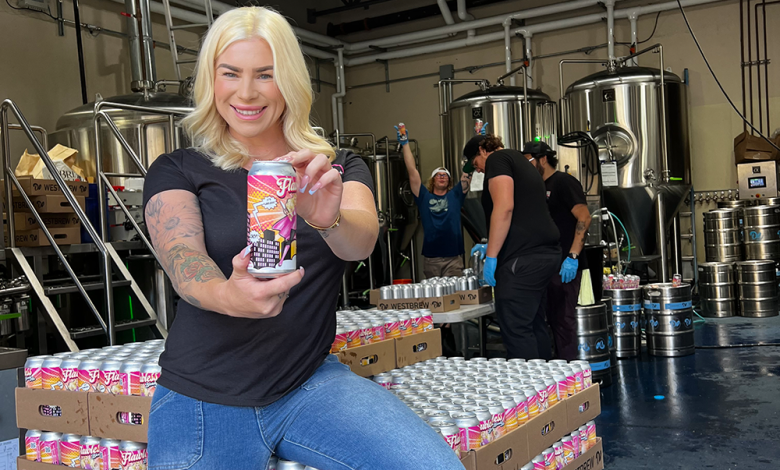
While it’s standard knowledge that big beer conglomerates such as Anheuser-Busch InBev and Molson Coors Beverage manufacture beers from multiple brands at their massive production facilities, many consumers would be surprised to discover that a number of craft-beer brands operate without their own brewery, opting instead to enter into contract-brewing agreements with other brewing companies.
In such cases, brewing companies — typically those of the larger ilk — with excess production capacity and room in their brewing schedule will produce beers for another business entity. This includes brewing, fermentation and cellaring, and packaging in kegs, cans and bottles. It typically also includes cold storage post-packaging before a client company’s beers are distributed to retailers.
In the late 1990s and early 2000s, there was a negative stigma associated with contract brewing. Many in the brewing industry saw it as a cop-out employed by brewers lacking passion or proficiency. Craft-beer fans of the era came to share those opinions and exhibited a lack of trust in a brand’s beers being brewed by another entity. It didn’t help that contract-brewed beers mostly consisted of boring, ubiquitous styles put forth by brands lacking a compelling story, point of view or marketing chutzpah.
But contract-brewing has come a long way over the past decade, especially in San Diego County, where it is more commonplace than ever and benefiting the companies that offer such services as well as their clients.
Why sign that contract?
There are myriad reasons why business owners elect to have their beers brewed by another company.
Some have lofty entrepreneurial aspirations and the business acumen to achieve them by building a brand and selling beer, but have no interest in constructing or running a manufacturing site. Building one requires a great deal of time and money, and while the former can be cut down by taking over an existing, turnkey brewery, the financial expenditure is still significant, leaving most new entrants to the industry with little capital to work with straight out of the gate.
Having one’s beers contract-brewed allows an owner to focus on marketing beer, selling it and generating revenue, without the expense or liability that comes with operating a brewery. There is also the added savings of not having to employ production, cellar or packaging staff, allowing an owner to have a lean team focused almost exclusively on sales and other revenue-generating areas of the business. Similarly, clients save on utilities and other avoided overhead costs.
Aside from financial motivations, in many cases a business owner with little or no brewing experience can lean on the expertise of seasoned professionals. The majority of the brewing companies that offer contract services grew to a size where they are large enough to do so based on the quality of their own products.
The best local example of this is AleSmith Brewing, a 28-year-old Miramar operation that has contract-brewed for roughly a decade. Known throughout the world for its award-winning beers, AleSmith offers as much — or as little — consultation in the area of recipe-development and refinement as its clients desire. They know their brewing system, beer styles and ingredients like the back of their hands and a number of their clients are thankful for the advice they have gotten working hand-in-hand with their brewing team.
But it’s not only brewery-less entrepreneurs who enter into contract-brewing relationships. So, too, do the owners of brewing companies that are maxed-out at their production facilities and need to brew more beer to meet market demand. In such cases, a brewery owner will enter into an agreement to have top-selling beers in their existing portfolios replicated as closely as possible by a contract operation.
In most cases, the contract brewery will have a bigger setup and be able to brew a client’s popular flagship beers in far larger batches. This is particularly advantageous for breweries that are expanding their distribution footprints to include new territories or states.
Who’s contracting, under contract?
As mentioned, AleSmith has become a contract-brewing powerhouse, joining Mission Brewing in the East Village, which has been a player in the arena for well over a decade. Miramar-based Ballast Point Brewing and North Park-based Mike Hess Brewing are other large operations that diversify their revenue streams in this manner, but other smaller breweries have dabbled in contract-brewing as well.
Earlier this year, San Marcos-based Creative Creature Brewing began working with Riverside County homebrewer and podcaster Justin Allen to produce the beers of his side hustle, BeerDad’s Brew Works. And over the summer, local chef and cookbook author Lauren Lawless (pictured above) teamed with Vista-based WestBrew to unveil the inaugural blonde ale of her Flawless Beer brand. While Lawless has plenty of experience developing flavors, she had zero experience with brewing or background in how beer is made. Working with experienced brewing professionals has allowed her to pour all of her energy into marketing her beer via television, magazines and news outlets, and getting her beer sold by bars, restaurants and other retail establishments.
Other local brands getting along with some help from their contracting friends include Cerveza Xteca, Hillcrest Brewing, Latitude 33 Brewing, Mason Ale Works, Paradise Hills Brewing, Shoots Beer and SouthNorte Beer. The lattermost of those concerns has won multiple gold medals for its beers at the most prestigious professional brewing competition in the world — Denver’s Great American Beer Festival — proving the quality that can be achieved in the modern era of contract-brewing, another key reason it’s now seen as a viable and intelligent option for certain individuals looking to make a splash in the beer industry.
This article originally appeared in the January 2, 2024 edition of The San Diego Union-Tribune

